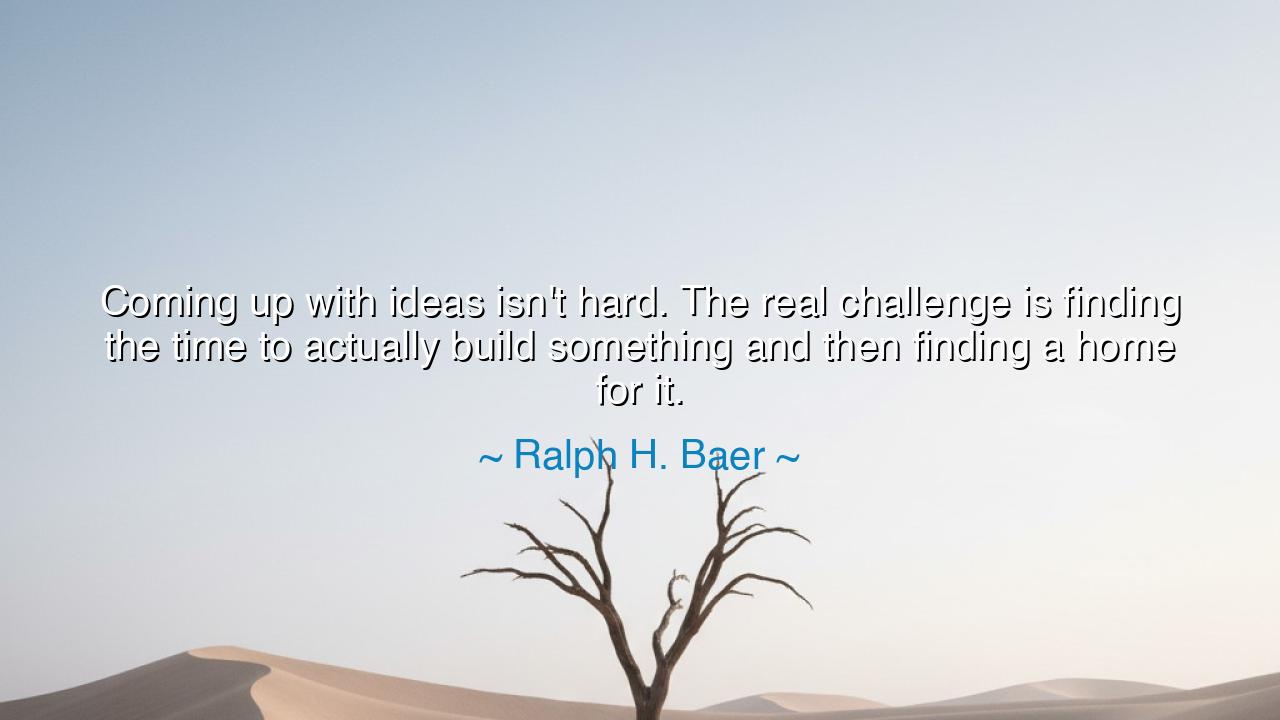
Coming up with ideas isn't hard. The real challenge is finding
Coming up with ideas isn't hard. The real challenge is finding the time to actually build something and then finding a home for it.






“Coming up with ideas isn’t hard. The real challenge is finding the time to actually build something and then finding a home for it.” Thus spoke Ralph H. Baer, the father of video games, the craftsman who transformed imagination into invention. In his words lies not only the lament of a creator, but the eternal truth of human endeavor: that inspiration is plentiful, but realization is rare. Baer reminds us that the mind is fertile soil where countless seeds of ideas may sprout, yet only those nurtured through labor, persistence, and patience will grow into living works. The challenge, therefore, is not to dream—but to build, and to find where those dreams may dwell.
Baer’s life itself illuminates the wisdom of his words. Born in Germany in 1922, he fled the shadows of tyranny and found refuge in America, where his restless mind and inventive spirit would one day give birth to the first video game console. He had ideas beyond counting—of games, of devices, of systems yet unimagined—but ideas alone were never enough. He labored tirelessly after hours, carving prototypes from wood and wire, often in solitude. His creations, though brilliant, were not immediately welcomed. For in every age, the world greets the new with suspicion. Yet Baer pressed on, proving that true invention demands not only vision but endurance—the courage to build despite doubt, and the faith to keep building until the world is ready to receive it.
In his quote, Baer distinguishes between two realms: the realm of imagination and the realm of execution. The first is boundless, effortless, and intoxicating; the second is narrow, difficult, and slow. Ideas are like stars—countless and beautiful—but to reach one requires a journey through the cold emptiness of effort. The ancients, too, knew this truth. The sculptor Phidias, who carved the gods into marble, once said that vision alone cannot move stone. Without labor, inspiration remains trapped in the mind, like light imprisoned in a lantern never lit. Baer’s challenge—to “find the time to build”—is the modern echo of this timeless call to discipline: make, do, persevere.
And yet, even creation is only the first struggle. Once something is made, the creator must still “find a home for it.” Here lies the second truth of Baer’s wisdom: that the world is not always ready for its inventors. The poet may finish his verse, the builder his bridge, the dreamer his machine—yet who will listen, who will use, who will understand? Baer himself faced this trial. When he first presented his video game prototype to executives, many dismissed it as a novelty, a toy without purpose. But he believed, and in time, his creation—what we now call the Magnavox Odyssey—became the foundation of an entire industry. His persistence turned rejection into legacy, his patience into triumph.
From his story we learn that time, not talent, is the true currency of creation. To build something meaningful, one must wrestle with days that seem too short, with fatigue that clouds the spirit, with doubt that whispers “later.” Yet the wise know there is no “later”—there is only now, the fleeting moment in which thought can be shaped into form. The builder who waits for the perfect time will never begin. Baer’s words, therefore, are both warning and encouragement: ideas are the breath of genius, but work is its body. Without labor, even the brightest thought fades like mist in morning light.
Consider, too, the story of Leonardo da Vinci, whose notebooks overflowed with designs for flying machines, submarines, and engines centuries ahead of their time. Yet many of his inventions never took flight, for he lacked the means—or the audience—to bring them forth. In this, we see both the glory and the tragedy of creation: that the world is shaped not only by the dreamers, but by those who dare to build and persist until their work finds its rightful home. It is not enough to imagine wings; one must forge them, test them, and endure the fall until one finally soars.
So, my children of imagination, take this lesson to heart: ideas are the beginning, not the end. Do not grow drunk on inspiration and call it achievement. Take your visions and carve them into the world, piece by piece, hour by hour. And when the world seems deaf to what you have built, remember Ralph Baer—who built anyway, who waited, who believed. For every creation has its appointed home, though it may take time to find it.
In the end, Baer’s wisdom is a flame for all who dream. “Coming up with ideas isn’t hard,” he says—because imagination is human. But to build, to persist, to plant your creation into the soil of the world and nurture it until it grows—that is divine. Let your ideas live not in thought, but in form. And when you find yourself weary, remember this: every cathedral began as a stone, every symphony as a note, every revolution as a single idea brought to life. The dreamer imagines—but the builder changes the world.






AAdministratorAdministrator
Welcome, honored guests. Please leave a comment, we will respond soon